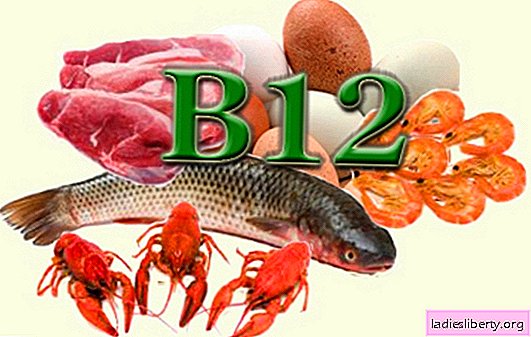
Back in the middle of the 19th century, a fatal case was described, which will later be called "pernicious anemia" or "malignant anemia." The cause of this disease was a sharp deficiency of vitamin B, which is often called the "red vitamin".
The origin and discovery of cobalt-containing substances (vitamin B 12) - why do they need the body
Biomedical research with vitamin B 12 has been conducted by American scientists since 1926. Subsequently, in 1934, he was awarded the Nobel Prize for unique discoveries in the treatment of pernicious anemia.
The effect of the "red vitamin" on the body of both adults and children is very difficult to overestimate. Vitamin B 12 is a group of cobalt-containing substances (cyanocobalamin, hydroxocobalamin, methylcobalamin and cobamamide) involved in the blood-forming functions of the human body. Lack of it (anemia) can create a lot of problems and disrupt the functions of the whole organism. Lead to serious health consequences. And sometimes to death.
At 12 it promotes the formation of DNA, the formation of cell fibers, the normal metabolism in the human body. Indispensable for fast-repairing liver, skin, and gastrointestinal cells. It supports normal blood pressure and immunity, the nervous system. Lowers cholesterol levels. It has a general regenerative effect on all tissues.
The chemical structure of vitamin B 12 is very difficult to synthesize in laboratories. Its unicellular microorganisms (bacteria and archaea) produce it. Neither plants nor animals are able to “produce” cobalamin (B 12). A person receives B 12 with the food of an animal (meat, fish, etc.) and milk (cheese, cottage cheese, sour cream, etc.) origin, or medication, in the treatment of any disease.
Why does the body need vitamin B 12 - symptoms of deficiency and overabundance
It is very difficult to pay attention to anemia (anemia), which can lead to a lot of diseases, but some symptoms of the body should alert you and refer you to a specialist.
A person with a deficiency of vitamin B 12 in the body can:
▪ get tired quickly;
▪ have poor appetite;
▪ notice an increase in nervousness;
▪ get a reaction slowdown.
In this case, depression is not uncommon. Numbness and tingling of the limbs. Motor impairment (coordination of movement of a particular muscle group). Shortness of breath when walking, heaviness in the back, increased palpitations, pallor of the skin are serious causes for concern.
People with alcohol addiction are also at risk.
The presence of parasites (tapeworms) in the body can be another vitamin deficiency problem.
Avitaminosis can affect women who use birth control pills and people taking drugs with sleeping pills. They disrupt the microflora, which prevents the absorption and assimilation of cyanocobalamin.
Is there a glut of red vitamin? Theoretically, everything is possible, and the symptoms that can show this are mainly associated with problems on the skin (urticaria), heart palpitations (tachycardia), impaired purine metabolism (synthesis and breakdown of purines). But in practice, this happens very rarely. Most often, vitamin deficiency is observed in children.
The ability of cyanocobalamin to be absorbed and accumulate in the liver cells, and then slowly consumed by the body, is often a salvation from a deficiency of this valuable vitamin in the body.
But this does not mean at all that in the event of vitamin deficiency, the doctor will prescribe you a loading dose with the help of injections or tablets, and you will "stock up" with the necessary quantity for many years. The main problem is malabsorption of B12 by the body.
Factors of influence on vitamin B 12 (rules for use and assimilation by the body)
Cyanocobalamin is resistant to temperature increase, soluble in water, has a red color, for which it is called "red vitamin".
The most complex vitamin in structure is also complex in assimilation by the body. It is absorbed in the ileum (lower part of the small intestine), and is produced in the large intestine; therefore, it cannot be synthesized and assimilated by one organism on its own. A person receives vitamin B 12, mainly with food. But, even if you are an avid meat-eater, and it would seem that it is possible to exclude a vitamin deficiency in you, and not among lovers of vegetarian cuisine, there are still factors that prevent the absorption of cyanocobalamin.
▪ In 12, it is categorically incompatible with vitamin C (ascorbic acid).
▪ Heavy metal salts combined with B 12 destroy it.
▪ The remaining B vitamins are completely incompatible with the "red vitamin".
▪ Lack of calcium ions in the body - a problem for absorption.
▪ The presence of pancreatic diseases does not contribute to the full absorption of cobalamin.
▪ During antibiotic treatment, you should abandon the medication B 12.
And yet, there are the most important “enemies” in the human body that reduce the chances of vitamin absorption to almost zero.
Firstly, this is a violation and change in microflora in the small intestine. The mold and fermentation environment of the intestine is the cause of multiple human vitamin deficiencies.
Secondly - helminths, which feed, including vitamin B 12.
How to contribute to vitamin B 12? Indeed, the correct application is the key to the necessary result. The answers are quite simple. If you were prescribed treatment with injections (intramuscularly, intravenously, intralumbally, etc.), and in addition to B 12, other drugs were prescribed, note that it is undesirable to mix them. It is better to alternate taking the drugs at different times, on different days.
Do not take with drugs that enhance blood coagulation.
Got a prescription for oral use - exclude citrus fruits from your diet. Do not get involved in foods with vitamin C.
Some doctors claim that tablets do not give such a result as subcutaneous and intramuscular administration of B 12.
Norms of consumption of vitamin B 12, and their proper use in food
Daily consumption of cobalt-containing substances:
▪ for children - 0.4-1.8 micrograms;
▪ men and women - 2.4 micrograms;
▪ pregnant and lactating women - 2.6-2.8 micrograms.
The average human intake of 5-7 micrograms per day.
Food products containing B 12:
▪ high rates: chicken, beef, pork liver; chicken heart; octopus meat;
▪ average indicators: mackerel herring and other seafood (carp, mussels, shrimps), turkey fillet, beef;
▪ low rates: eggs, cottage cheese, yogurt, milk, sour cream.
These products retain their vitamin perfectly even after heat treatment and freezing, so all the necessary amount of cobalt-containing substances will enter your body unchanged.
A controversial issue remains the intake of vitamin B 12 by people who prefer vegetarian cuisine. Allegations that this unique vitamin is found in seaweed (Spirulina) and can replace the consumption of animal products are incorrect. Therefore, people with this form of nutrition need to “listen” to their body in a special way or consult their doctor in this matter.











